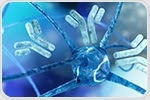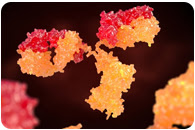|
| | April 24, 2019 | |
| | |
| | The latest antibodies news from News Medical | |
|
|
 |
| |  Immuno-PET using Radiolabeled Antibodies Immuno-PET using Radiolabeled Antibodies
Immuno-PET, involving the labelling of monoclonal antibodies (mAbs), antibody fragments or engineered protein scaffolds, has the potential to offer non-invasive criteria able to identify the presence and accessibility of the target, to measure more accurately tumor response in a timely fashion, and to assist in patient stratification.
This webinar covers the assessment of drug resistance and prediction of treatment response using the new immuno-PET/affibody agents.
| |
|
|
|
|
 |
| |  Antibodies are proteins that can bind to specific molecules called antigens. They have different portions in their Y-shaped structure that can bind to antigens and effector molecules. Several types of antibodies such as primary and secondary and monoclonal and polyclonal antibodies with varying specificities have been developed in recent years. Antibodies are proteins that can bind to specific molecules called antigens. They have different portions in their Y-shaped structure that can bind to antigens and effector molecules. Several types of antibodies such as primary and secondary and monoclonal and polyclonal antibodies with varying specificities have been developed in recent years. | |
|
| |  The earliest reference to antibodies was from Emil von Behring along with Kitasato Shibasaburo in 1890 who found the presence of a neutralizing substance in the blood that could counter infections. They developed the serum against diphtheria. This they did by transferring serum produced from animals immunized against diphtheria to animals suffering from it. This serum could cure the infected animals. The earliest reference to antibodies was from Emil von Behring along with Kitasato Shibasaburo in 1890 who found the presence of a neutralizing substance in the blood that could counter infections. They developed the serum against diphtheria. This they did by transferring serum produced from animals immunized against diphtheria to animals suffering from it. This serum could cure the infected animals. | |
|
| |  Antibodies are used extensively as diagnostic tools in many different formats. The term applied for antibody based diagnostic tests is “immunoassay”. Antibody-based immunoassays are the most commonly used confirmatory diagnostic assays and is the fastest growing technologies for the analysis of biomolecules. Antibodies are used extensively as diagnostic tools in many different formats. The term applied for antibody based diagnostic tests is “immunoassay”. Antibody-based immunoassays are the most commonly used confirmatory diagnostic assays and is the fastest growing technologies for the analysis of biomolecules. | |
|
| |  All microbes trigger an antibody response. Due to diversity in microbes, the antibody needs to adopt variations to allow their interactions with many different antigens. Human, for example, generate about 10 billion different antibodies. Each of these is specific for distinct epitope of an antigen. Since each of the antibodies are different for each of the antigens, the body needs to be capable for generating these proteins. All microbes trigger an antibody response. Due to diversity in microbes, the antibody needs to adopt variations to allow their interactions with many different antigens. Human, for example, generate about 10 billion different antibodies. Each of these is specific for distinct epitope of an antigen. Since each of the antibodies are different for each of the antigens, the body needs to be capable for generating these proteins. | |
|
|
|
|










































No hay comentarios:
Publicar un comentario